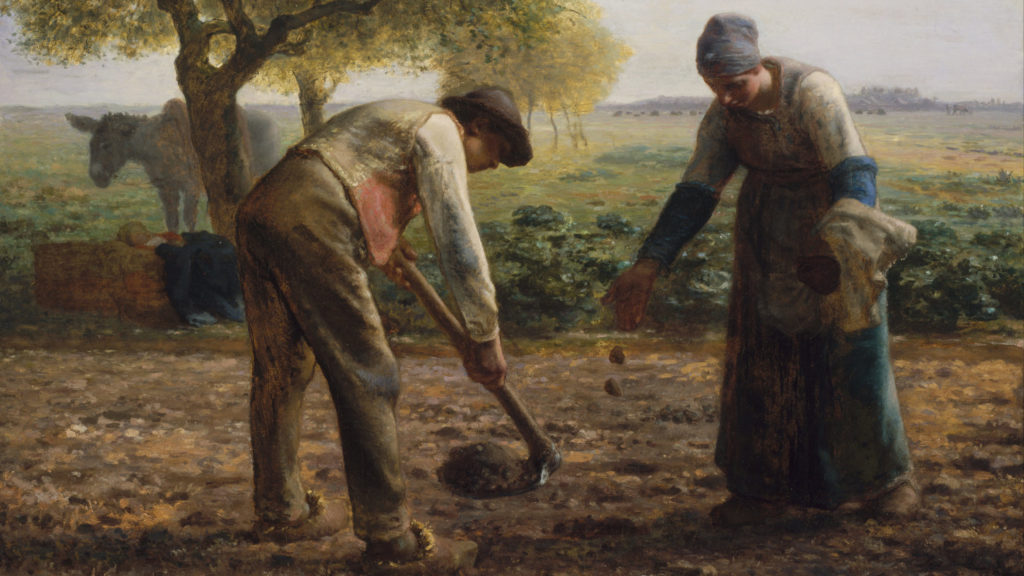I did not think I needed to add to the commentariat regarding Kansas City Chiefs kicker Harrison Butker and his commencement speech at Benedictine College. Many finer thinkers than me have already chimed in (case in point, Amy Welborn’s column in the May 31 edition of Angelus).
I am not here to pick a fight — mainly because I would lose to Welborn, who can write me into the ground — but I think she was a little harsh when she declared that Butker had a “stupid job.”
I’m the king of stupid jobs. I used to write one-hour TV cop shows — it does not get much more trivial than that.
So kicking a ball through goalposts, to me, is just another job. If you aren’t operating on someone’s heart, saving someone unjustly accused from prison, or confecting the body, blood, soul, and divinity of Our Lord, most jobs are pretty lame.
But Butker’s words about husbands and wives got me thinking about jobs, and roles that men and women, husbands and wives, fathers and mothers have to cope with in this modern world.
When Welborn quoted Christian commentator Alex Sosler, I had a “stop the presses” moment. The quote mused on how our modern and mechanized culture, and all of its false promises, has wreaked havoc on the family dynamic. It was a hark to another time “where men and women are called to mutual homemaking, where the career vs. family struggle disappeared altogether.”
Sosler was describing my grandparents, who practiced the revolutionary concept of agriculture — first developed in Mesopotamia thousands of years before — that changed human history forever. But for the most part, they sat out the other “giant leap” of mankind, the Industrial Revolution, which also changed the world forever.
There were plenty of planes, trains, and automobiles when my grandparents were working their small farm in northern Arkansas during the first half of the last century, but they did so sans the modern mechanisms that many of their peers availed themselves to.
The razor-sharp discs of the plow my grandfather used may have been machined by a nameless factory worker in Ohio, but the plow was pulled by a two-mule team, Beck and Kate. My grandparents lived without electricity and, therefore, no refrigeration. They had a spring house and a root cellar. My grandfather passed away in 1963, having never driven a car or had a driver’s license.
My grandmother juggled two careers. First, she was a homemaker when being a homemaker did not just mean you kept a clean house and supervised children. She was always intricately linked to — and part of — her husband’s job. She was an expert in animal husbandry, accounting, and cost-benefit analysis. Together they had a side business — my grandfather was the local Justice of the Peace and would preside over weddings while my grandmother served as the official witness. In every sense of the phrase, they both worked from home.
The Industrial Revolution changed all that for so many. It yanked men out of the home and chained them to factory assembly lines and work that, yes, can probably be described as “stupid.”
Welborn’s article aptly colors this world we have built where everything is so mechanized that relationships between husbands and wives can be crushing. The evidence can be found in the debris of so many broken marriages and homes.
Nature has reclaimed my grandparent’s farm. That lifestyle will not be coming back any time soon, as the industrial genie will not go back into the bottle without a fight. There are economic realities wrought by our “progress” that Butker’s speech did not address. The average tuition of a Catholic high school, for example, is now what tuition at a state college used to be, if not more.
Homeschooling is not an option for a lot of families where both mom and dad are working outside the home, not so they can keep up payments on their boat in Marina Del Rey, but because they need to keep the lights on in a two- bedroom Los Angeles apartment, where the median rent is $2,800 a month.
Those kinds of stressors have a lot of us doing stupid jobs for The Man, as Welborn put it. We can’t all live in a unified agrarian simplicity like my grandparents but, as the column suggests so poignantly, we certainly can all answer our own “call to be conformed to Christ.” That applies whether one is a kicker of footballs, a tiller of soil, or writer of words.

